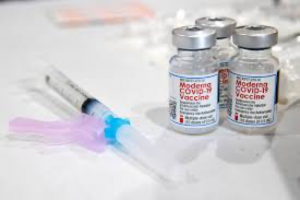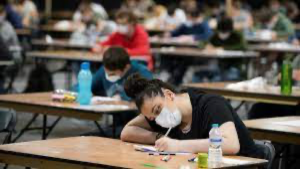 Though it is hard to believe, over a year has passed since COVID-19 completely turned society upside down. In the early days of the pandemic, job loss, product shortages, and work from home quickly became the new normal. As the pandemic progressed, debates about whether masks really work became highly politicized, and disagreements often caused rifts in families, relationships, and friendships. Though the pandemic is not over yet, society is inching closer to the light at the end of the tunnel as states continue to distribute and vaccinate its populations.By early 2021, the U.S. Food and Drug Administration (FDA) issued an emergency use authorization (EUA) for three vaccines: Pfizer-BioNTech, Moderna, and Janssen/J&J. As of mid-March 2021, these vaccines have only been recommended for use in persons eighteen and over, but studies on the vaccines’ safety and effectiveness in children is in progress. The introduction of the vaccines into society has shifted the mask requirement debate to a vaccine requirement debate; one of these debates is whether COVID-19 vaccines should be mandated in order to allow students back onto college campuses. Rutgers University in New Jersey has already made the decision to mandate vaccines, but has stated that students may request an exemption if it is for a religious or medical reason. Additionally, fully virtual students, faculty, and staff are not required to receive the vaccine.
Though it is hard to believe, over a year has passed since COVID-19 completely turned society upside down. In the early days of the pandemic, job loss, product shortages, and work from home quickly became the new normal. As the pandemic progressed, debates about whether masks really work became highly politicized, and disagreements often caused rifts in families, relationships, and friendships. Though the pandemic is not over yet, society is inching closer to the light at the end of the tunnel as states continue to distribute and vaccinate its populations.By early 2021, the U.S. Food and Drug Administration (FDA) issued an emergency use authorization (EUA) for three vaccines: Pfizer-BioNTech, Moderna, and Janssen/J&J. As of mid-March 2021, these vaccines have only been recommended for use in persons eighteen and over, but studies on the vaccines’ safety and effectiveness in children is in progress. The introduction of the vaccines into society has shifted the mask requirement debate to a vaccine requirement debate; one of these debates is whether COVID-19 vaccines should be mandated in order to allow students back onto college campuses. Rutgers University in New Jersey has already made the decision to mandate vaccines, but has stated that students may request an exemption if it is for a religious or medical reason. Additionally, fully virtual students, faculty, and staff are not required to receive the vaccine.
But can schools enforce compulsory vaccines? Currently, all fifty states require vaccination for other diseases such as polio, chickenpox, and the measles for children to enter into the public school system. The legal basis for mandated vaccines dates back to the smallpox era. In Jacobson v. Massachusetts, 197 U.S. 11 (1905), the authority of the state to enforce compulsory vaccination laws was upheld. The Court’s decision stemmed from the notion that individual liberty is subject to the state police power as it is not absolute. In simpler terms, the vaccine can be required by the state without infringing on any constitutional rights.
Instead, some concede it would be better to incentivize students rather than force. Dr. Carlos del Rio, a distinguished Professor of Medicine at Emory University School of Medicine, Infectious Disease Division, suggested students should be enticed with special privileges such as, having the ability to attend special events and use exclusive discounts should they choose to inoculate. Dickinson State University in North Dakota has already adopted a similar approach. Students who are vaccinated receive a pin or a bracelet that signifies full vaccination; the pin or bracelet exempts them from the campus-wide mask mandate. A program like this operates the same way as peer pressure; it relies on unvaccinated students feeling excluded from campus activities and other freedoms, especially when it precludes them from participating on campus with their friends.
 While there is a possibility other states may adopt a compulsory vaccination law for students to return to campus as normal, Florida governor Ron DeSantis has already briefed the public and stated that vaccine passports will not be needed in the State of Florida. Therefore, it can be expected that vaccinations will not be required within the state’s higher education system but instead remain recommended.
While there is a possibility other states may adopt a compulsory vaccination law for students to return to campus as normal, Florida governor Ron DeSantis has already briefed the public and stated that vaccine passports will not be needed in the State of Florida. Therefore, it can be expected that vaccinations will not be required within the state’s higher education system but instead remain recommended.



 Though it is hard to believe, over a year has passed since COVID-19 completely turned society upside down. In the early days of the pandemic, job loss, product shortages, and work from home quickly became the new normal. As the pandemic progressed, debates about whether masks really work became highly politicized, and disagreements often caused rifts in families, relationships, and friendships. Though the pandemic is not over yet, society is inching closer to the light at the end of the tunnel as states continue to distribute and vaccinate its populations.By early 2021, the U.S. Food and Drug Administration (FDA) issued an emergency use authorization (EUA) for three vaccines: Pfizer-BioNTech, Moderna, and Janssen/J&J. As of mid-March 2021, these vaccines have only been recommended for use in persons eighteen and over, but studies on the vaccines’ safety and effectiveness in children is in progress. The introduction of the vaccines into society has shifted the mask requirement debate to a vaccine requirement debate; one of these debates is whether COVID-19 vaccines should be mandated in order to allow students back onto college campuses. Rutgers University in New Jersey has already made the decision to mandate vaccines, but has stated that students may request an exemption if it is for a religious or medical reason. Additionally, fully virtual students, faculty, and staff are not required to receive the vaccine.
Though it is hard to believe, over a year has passed since COVID-19 completely turned society upside down. In the early days of the pandemic, job loss, product shortages, and work from home quickly became the new normal. As the pandemic progressed, debates about whether masks really work became highly politicized, and disagreements often caused rifts in families, relationships, and friendships. Though the pandemic is not over yet, society is inching closer to the light at the end of the tunnel as states continue to distribute and vaccinate its populations.By early 2021, the U.S. Food and Drug Administration (FDA) issued an emergency use authorization (EUA) for three vaccines: Pfizer-BioNTech, Moderna, and Janssen/J&J. As of mid-March 2021, these vaccines have only been recommended for use in persons eighteen and over, but studies on the vaccines’ safety and effectiveness in children is in progress. The introduction of the vaccines into society has shifted the mask requirement debate to a vaccine requirement debate; one of these debates is whether COVID-19 vaccines should be mandated in order to allow students back onto college campuses. Rutgers University in New Jersey has already made the decision to mandate vaccines, but has stated that students may request an exemption if it is for a religious or medical reason. Additionally, fully virtual students, faculty, and staff are not required to receive the vaccine.
 While there is a possibility other states may adopt a compulsory vaccination law for students to return to campus as normal, Florida governor Ron DeSantis has already briefed the public and stated that vaccine passports will not be needed in the State of Florida. Therefore, it can be expected that vaccinations will not be required within the state’s higher education system but instead remain recommended.
While there is a possibility other states may adopt a compulsory vaccination law for students to return to campus as normal, Florida governor Ron DeSantis has already briefed the public and stated that vaccine passports will not be needed in the State of Florida. Therefore, it can be expected that vaccinations will not be required within the state’s higher education system but instead remain recommended.